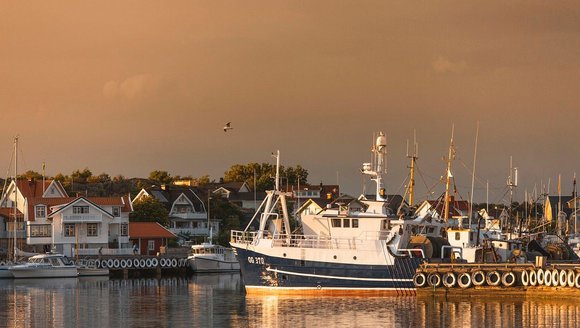Integrated Systems Ecology
Marine ecosystems and fisheries are complex systems, shaped by a mix of oceanographic, biological, socio-economic, and institutional components.
Climate change is an important influence on these complex systems and a key consideration in much of our research. Our lab distills complex ocean data to understand how the mix of these components affects the ecosystem, fisheries, and coastal communities. We apply ecosystem research to support conservation planning for species of concern, such as Atlantic salmon, and climate adaptation in marine fisheries, including Maine’s lobster fishery.
We aim to:
-
Develop climate-resilient conservation and management strategies.
-
Provide the information stakeholders need to sustain fish populations and fisheries in changing ecosystems.
-
Work closely with fishing industry participants, managers, planners, and other stakeholders to achieve ecological and socio-economic goals.
Lab Team
Our Methods
By taking an integrative and holistic approach, our lab makes understanding complex ocean interactions manageable.
We use data from multiple sources that represent how ocean conditions, fish populations, and marine fisheries have changed over time. We conduct statistical analyses to understand relationships among different components of the ecosystem and develop models to predict future population, community, or fishery characteristics given observed or projected ecosystem conditions. Understanding how multiple components of the ecosystem interact to shape outcomes requires interdisciplinary collaboration, and we routinely work with climate scientists, oceanographers, ecologists, economists, social scientists, fishermen, and other stakeholders in our research.
-
Statistical analyses
-
Ecosystem modeling
-
Interdisciplinary collaboration
-
Data management and synthesis
By taking an integrative and holistic approach, our lab makes understanding complex ocean interactions manageable.
We use data from multiple sources that represent how ocean conditions, fish populations, and marine fisheries have changed over time. We conduct statistical analyses to understand relationships among different components of the ecosystem and develop models to predict future population, community, or fishery characteristics given observed or projected ecosystem conditions. Understanding how multiple components of the ecosystem interact to shape outcomes requires interdisciplinary collaboration, and we routinely work with climate scientists, oceanographers, ecologists, economists, social scientists, fishermen, and other stakeholders in our research.
- Statistical analyses
- Ecosystem modeling
- Interdisciplinary collaboration
- Data management and synthesis
Research Lab Projects
Explore our recent impact
-
![Advancing Climate-Resilient Marine Fisheries during the UN Decade of Ocean Science for Sustainable Development]()
Advancing Climate-Resilient Marine Fisheries during the UN Decade of Ocean Science for Sustainable Development
We will work within the framework of the UN Ocean Decade program Fisheries Strategies for Changing Oceans and Resilient Ecosystems by 2030 (FishSCORE2030) to synthesize …
-
![Climate Adaptation Strategies for Northeast U.S. Fishing Communities]()
Climate Adaptation Strategies for Northeast U.S. Fishing Communities
We are leading several interdisciplinary projects to provide community-scale information that can be used to guide adaptation and planning for future ecosystem and fishery changes. …
-
![SNAPP: Climate Resilient Fisheries Working Group]()
SNAPP: Climate Resilient Fisheries Working Group
This SNAPP working group will play a key role in developing guidance on management approaches, processes, and tools that can operationalize and implement resilience principles …
-
![Resilience, Adaptation, and Transformation in Lobster Fishing Communities]()
Resilience, Adaptation, and Transformation in Lobster Fishing Communities
Using the American lobster fishery as a case study, we will draw lessons from community experiences through a downturn in lobster populations in Southern New …
-
![Fisheries Strategies for Changing Oceans and Resilient Ecosystems by 2030 (FishSCORE2030)]()
Fisheries Strategies for Changing Oceans and Resilient Ecosystems by 2030 (FishSCORE2030)
This program is building a global network of scientists, fishing sector members, practitioners, and policy experts that aims to co-develop approaches to sustain marine fisheries, …
-
![Gulf of Maine Warming Updates]()
Gulf of Maine Warming Updates
Over the past decade, scientists have led a body of research that highlights the rapid pace of warming in the Gulf of Maine. To help …
-
![Atlantic Salmon in a Changing Northwest Atlantic Ecosystem]()
Atlantic Salmon in a Changing Northwest Atlantic Ecosystem
Atlantic salmon populations in North America and Europe have declined dramatically in recent decades, threatening the viability of many populations. Key drivers in the Northwest …
-
![Using Satellite Data to Support Sustainable Fisheries]()
Using Satellite Data to Support Sustainable Fisheries
We are working to develop a Fisheries and Climate Toolkit (FaCeT) to track and forecast fisheries-relevant physical and biological ocean features that will inform dynamic …
-
![Evaluating Climate Change Adaptation Strategies]()
Evaluating Climate Change Adaptation Strategies
Our project will work to develop widely applicable general management strategies that promote the conservation of shifting marine fish stocks, and support the ability of …
Read More
-
FishSCORE2030: Supporting Climate-Resilience in Fisheries
GMRI Research Scientist Dr. Kathy Mills is leading a new collaborative effort to build an international network of scientists, stakeholders, and practitioners who will identify …
Tidings
-
New: Climate & Fisheries Planning Tool
The Science for Nature and People Partnership (SNAPP) working group on climate-resilient fisheries, led by GMRI Senior Research Scientist Dr. Kathy Mills, recently developed a …
Tidings
-
GMRI Scientist Appointed To National Leadership Role
Dr. Kathy Mills will serve as a Chapter Lead for the Fifth National Climate Assessment — a comprehensive, congressionally mandated report that is collaboratively developed …
Tidings
-
Searching for Clues in Salmon Scales
We spoke to GMRI Research Scientist Dr. Kathy Mills and three members of her Integrated Systems Ecology Lab to learn more about their approaches to …
Perspectives












